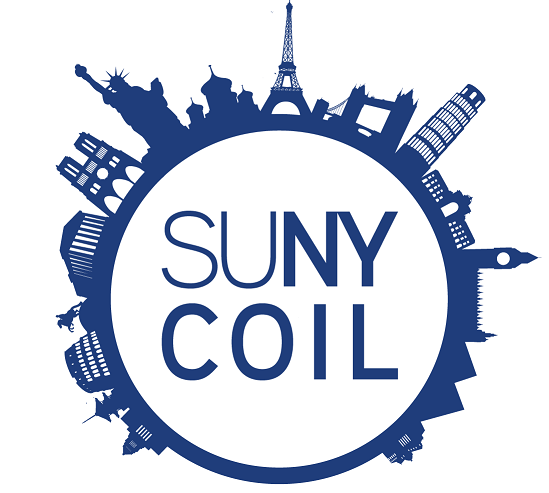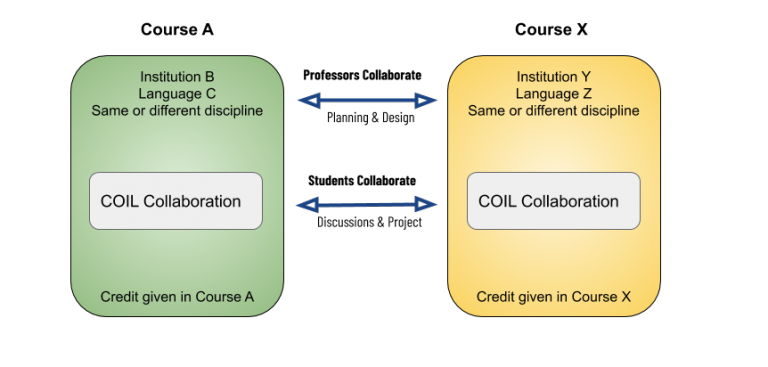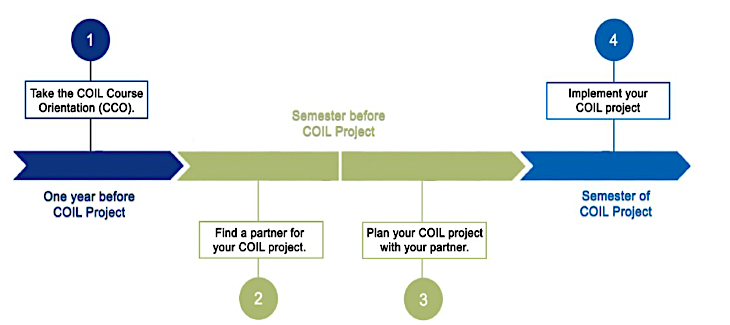How OSCQR Supports COIL
English| Español
COIL+OSCQR Standards Support Collaborative Online International Learning (COIL)
COIL+OSCQR standards offer a comprehensive approach to the design of engaging, effective, and efficient COIL Virtual Exchange (VE) modules in any (inter)disciplinary course, or content. In conjunction with the OSCQR rubric for online course review and refresh, the COIL+OSCQR standards support high quality online teaching and instructional design in the implementation of a COIL Virtual Exchange module in any course discipline or content.
COIL+OSCQR standards support COIL in several ways:
- COIL+OSCQR standards are flexible and extensible. Standards are a guide to designing a COIL course/module.
- They are not restricted to use in mature online courses and content. COIL+OSCQR standards can be used formatively with new COIL faculty to help guide, inform and influence the design of their new online COIL course module.
- The process and COIL+OSCQR standards employed in this approach are not meant for faculty, or course evaluation. Instead, they serve as a professional development tool, aimed at refreshing the COIL instructor’s understanding of effective online course design practices. The focus lies on guiding instructors to enhance online COIL course/module quality, engagement, effectiveness and efficiency, rather than on conducting instructional evaluation, or quality assurance assessments.
- Using the COIL+OSCQR standards assists instructors to generate an action plan aligned with the Community of Inquiry (CoI) model and Social Learning Theories. It aids in identifying and addressing areas for enhancement in the COIL module’s social presence, cognitive presence, and teaching presence, as well as intercultural competencies, and teamwork skills in global education.
- The COIL+Standards are openly licensed and free to use and adapt by anyone regardless of their affiliation with SUNY or COIL.
The COIL pedagogy calls for the collaboration, communication, and teamwork with two or more international instructors, within their courses, and between their students. Instructors partner to design the virtual experience, and learners across courses are partnered to complete the activities designed. The virtual COIL experience becomes part of each instructor’s course, enabling all students to have a virtual intercultural experience, each within their own course of study. This model supports collaboration, intercultural communication, cultural awareness, and teamwork skills through ice-breaking activities, intercultural assignments, and a culminating team project, or presentation.

COIL+OSCQR standards serve various purposes:
- They set the standards for co-instructor collaboration, intercultural communication, cultural awareness, and teamwork skills.
- They set the standards for peer learner collaboration, intercultural communication, cultural awareness and teamwork skills.
- They support instructors and instructional designers in faculty development and professional activities related to the design of a COIL project, influencing the creation of innovative virtual global experiences for learners.
- They support and promote diversity, equity, and inclusion in virtual online intercultural instructional experiences.
- They support a collectivist versus individualist approach to how we work together across cultures in terms of power distance/dynamics, and uncertainty avoidance approaches.
- They facilitate self-assessment and prioritize design improvements by individual instructors, and promote a culture of continuous review and improvement of existing project / course content.
- They facilitate a peer course refresh process between co-instructors to engage in collaborative iteration and continuous improvements of their COIL course/module.
- They can be used by instructional designers in a more formal online course quality assurance process at program, departmental, or institutional levels.
- They can be used by collaborative teams, consisting of at least three individuals with diverse specialties, such as instructional design, course authors, and external expertise (e.g., subject matter experts, online librarians, students, instructional technologists, multimedia designers, and other faculty), to approach course review and continuous improvement from various perspectives.

Accessibility
Enterprise IT Policy NYS-P08-005, Section 504 of the Rehabilitation Act, and the Americans with Disabilities Act.
- Incorporating the COIL+OSCQR standards into OSCQR extends and promotes accessibility comprehensively across all the standards.
- The COIL+OSCQR approach incorporates accessibility formatively in the COIL course design process, rather than solely for summative review purposes. This ensures that accessibility considerations are implemented at the start of COIL course module design and faculty development activities.
- The COIL+OSCQR standards provide resources in the form of explanations, examples, and suggestions (including citations) for specific COIL course design elements, practices, and improvements for each standard as a menu of options available to each reviewer to supplement reviewer feedback.
For more information:
- The SUNY Collaborative Online International Learning Center (COIL)
- About this Project
- What is COIL?
- COIL+OSCQR Standards
![]() The COIL+OSCQR standards and process are made available as a component of the OSCQR Rubric under the Creative Commons Attribution 4.0 International License (CC By 4.0). To view a copy of this license, visit https://creativecommons.org/licenses/by/4.0/. The OSCQR Rubric, Dashboard, and Process were originally developed by the State University of New York (SUNY), through SUNY Online, Online Teaching. SUNY Online and its logo are registered trademarks of the State University of New York.
The COIL+OSCQR standards and process are made available as a component of the OSCQR Rubric under the Creative Commons Attribution 4.0 International License (CC By 4.0). To view a copy of this license, visit https://creativecommons.org/licenses/by/4.0/. The OSCQR Rubric, Dashboard, and Process were originally developed by the State University of New York (SUNY), through SUNY Online, Online Teaching. SUNY Online and its logo are registered trademarks of the State University of New York.